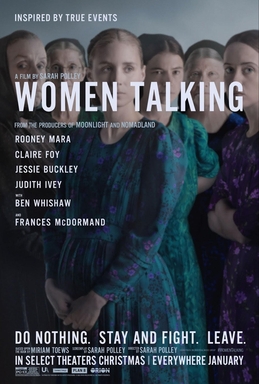WOMEN TALKING
The world of Women Talking is a very isolated, very still one. The film, for better or worse, reflects this world. Far too stage-bound and serious, Women Talking keeps the viewer forever apart from the traumas and fears these women face.
Via voiceover from Autje (Kate Hallet) we learn that a group of Mennonite women have been drugged and violently attacked and raped by the men. While some of the men have been arrested, the other men have gone to town to bail them out. The women now gather in a hayloft to decide what they collectively will do.
As they cannot read or write, they require the help of schoolteacher August (Ben Whishaw), the sole male who is not attacking women. August keeps notes as the women consider the tie between two of the three options: stay and fight or leave (doing nothing losing). Over this night of talk, the various women consider such topics as the state of their souls, the undercurrent of romance between August and Ona (Rooney Mara), and what (and whom) to carry off should they opt to. Decision made, the women stop talking and start doing.
Someone I know made a cynical joke about Women Talking; he quipped that with a title like "women talking", did the filmmakers want to drive people away from seeing the film? While a bit harsh, I can see how the mere title could put some people off. As for the film itself, my major issue with Women Talking is that the overall experience is like watching a filmed play. The limited setting, the somewhat theatrical nature of the performances all conspired to make Women Talking a filmed play.
That is odd given that Women Talking is an adaptation of a novel. Over and over the film loves to tell but not show. I do not think we need to see the violent assaults that the women suffered. However, because we do not see them interact with the men save August, we also do not get that sense that the women are in danger.
To a certain point, one can appreciate writer/director Sarah Polley creating this extremely hermetically sealed world. Apart from when we hear a 2010 Census vehicle playing Daydream Believer calling for them to literally be counted, Women Talking does not look or feel like it is taking place in contemporary times. That world-building, however, also works against the film because none of the women or their plight come across with the force that both could have.
Everyone in Women Talking is so caught up in being serious to be sincere. Since we do not know who the women are, the various women start melding into one. A lot of Women Talking is very still, which is another issue. A chance to show the various women as distinct personalities is lost in the rush to emphasize the seriousness of their plight.
Why could not the women make individual choices to leave or go? If you had one or two women advocating for one or the other, we might have had a stronger film. As it stands, the speeches all spoken the same way never build the crisis. If more time was spent in building this world, we could have believed that the women faced a spiritual and physical crisis. It simply did not come through, and no amount of telling us can make it so.
Sometimes Women Talking is heavy-handed with its message on the dangers of toxic masculinity. "Our freedom and safety are the ultimate goals. And it is men who prevent us from achieving those goals," one of the women states. For a religious community, the women have no issue with one of the rape victims, Nettie. Nettie, apparently, is so traumatized by the men that Nettie becomes one, using the name "Melvin" (August Winter). Melvin interacts with children only, refusing to speak to any adults.
That is, until one of them gets through Melvin's hand gestures that the men are coming. "Thank you, Melvin," she says. Melvin finally speaks, saying "Thank you for saying my name". If there was some kind of transgender message popping out, it seems a curious place to put it in. Also, does the film inadvertently suggest that people turn transgender due to traumatic experiences?
Women Talking does have some positives. The cinematography does bring out some beautiful visuals, and the score is quite strong. There are some good performances as well. It is unfortunate that because I genuinely not remember who played which character, I cannot single out specific people. I dislike the voiceover which narrates to an unborn child.
Women Talking is too talky, more interested in telling than in showing or being. Mistaking somberness for seriousness, Women Talking will not have many people listening.



No comments:
Post a Comment
Views are always welcome, but I would ask that no vulgarity be used. Any posts that contain foul language or are bigoted in any way will not be posted.
Thank you.